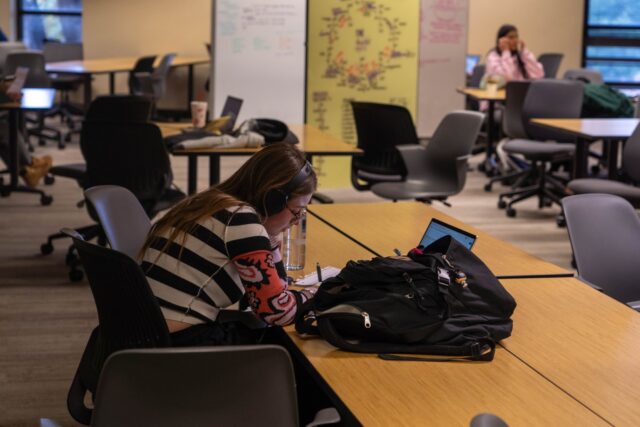Emily Schoch | Staff Writer
As the semester winds to a close, the energy on Baylor’s campus shifts from the excitement of holiday plans to the looming pressure of final exams. For many students, this season brings sleepless nights, crowded study spots and a wave of anxiety as they juggle deadlines and tests.
Victoria sophomore Aryan Gaalla said finals week produces lot of stress for him.
“I have two finals on the same day, so that’s pretty stressful,” Gaalla said. “I feel like I don’t have any time to study for all of my finals because I have homework to do on top of the tests.”
Before finals week starts, students should to make a list of all the finals, papers and projects that they have due. They should then prioritize in calendar format when they will start each task, so that each class receives equal attention.
“Creating a schedule will help you feel more in control and less overwhelmed. It can also help you manage your time efficiently as you can better plan for what needs to happen and when,” the National Alliance on Mental Illness says.
LesLee Funderburk, associate professor of nutrition sciences, said that creating a study plan is directly correlated to students’ success.
“[Students should] make sure that they have a plan to study in chunks of time versus doing long periods of time for study habits,” Funderburk said.
Additionally, The National Sleep Foundation recommends seven to nine hours of sleep for young adults. A research study conducted by the foundation showed that out of 191 undergraduate students, 73% exemplified some form of sleep struggle.
Gaalla said that he is part of the 73% who struggle with getting an effective night of sleep.
“I definitely do not get enough sleep, especially during finals week, because I’m so stressed about studying that it’s hard for me to even fall asleep,” Gaalla said.
Not getting enough sleep has a connection to brain function and productiveness, according to the CDC. Consequences include tension, irritability, depression, confusion and poor academic performance.
Funderburk said eating well is a good way to improve academic performance. According to the National Alliance on Mental Illness, eating junk food produces less energy while healthy foods are energizing.
“Good balanced meals and fluid, especially water intake, [are important] during that time,” Funderburk said.
Gaalla said he made a plan to reduce stress during finals season.
“Coming up, I’m going to schedule study times for different subjects. Hopefully, that’ll help me be less stressed going into finals week,” Gaalla said.



